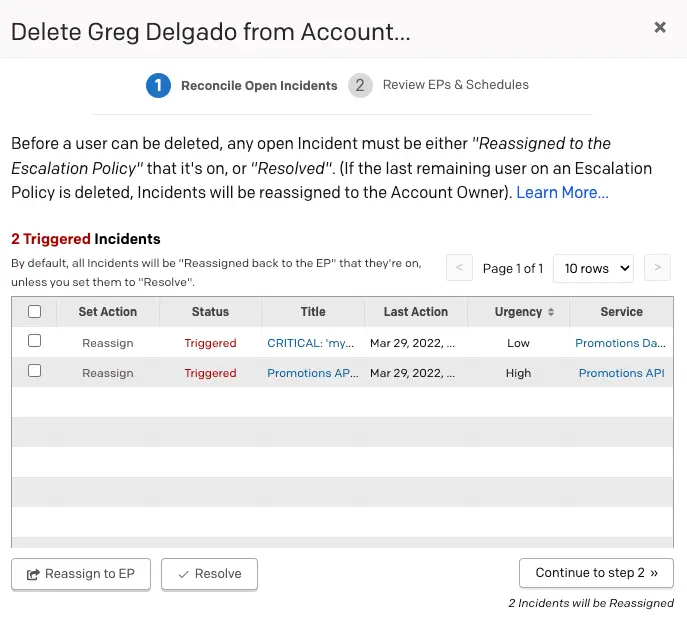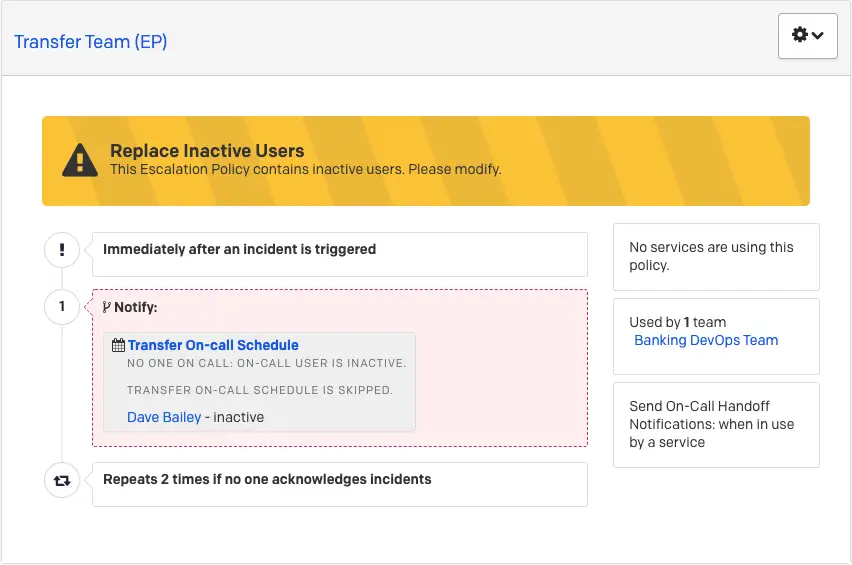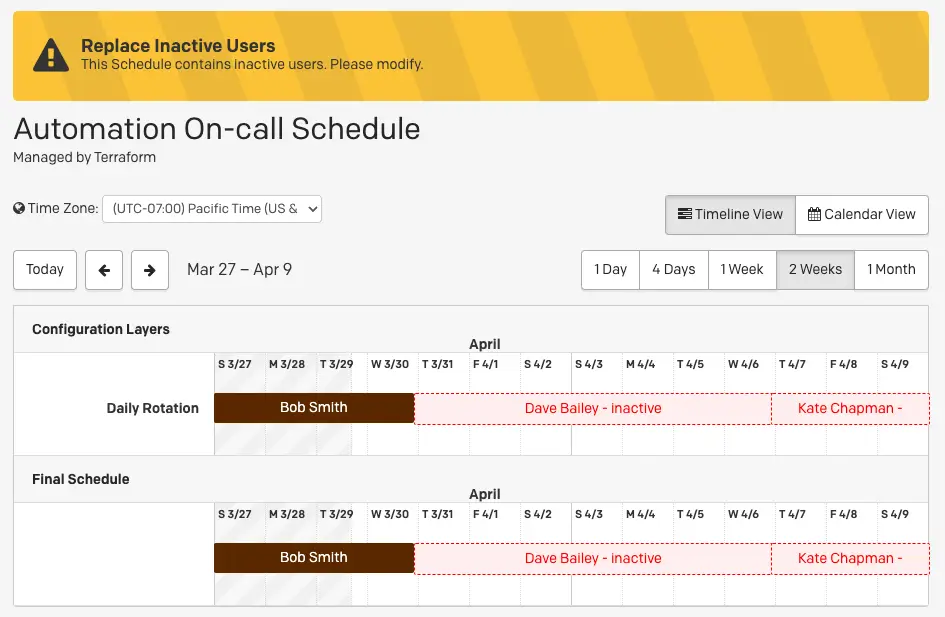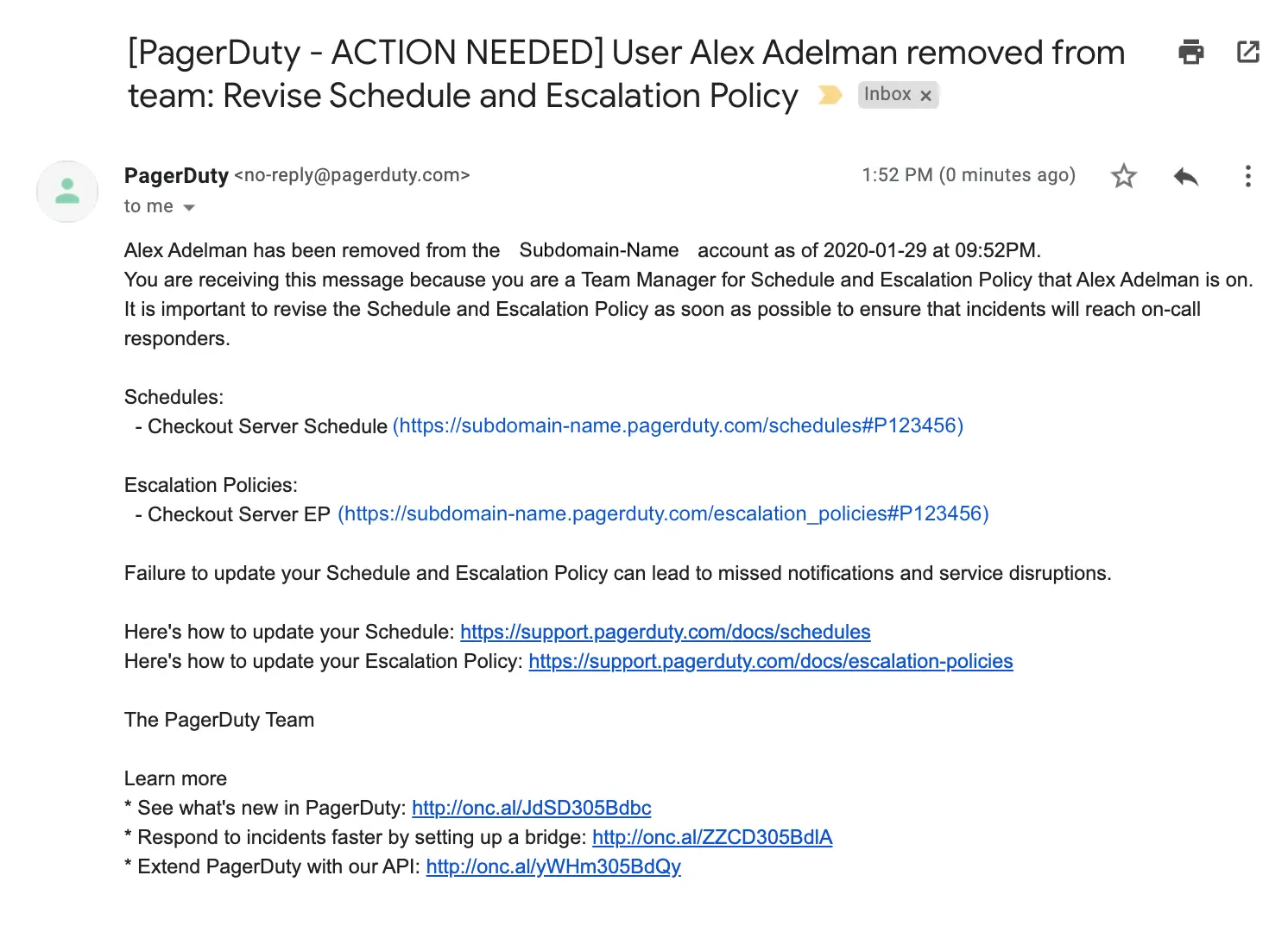Offboarding
Remove users from incidents, escalation policies and schedules
The offboarding feature allows administrators to easily deprovision users from their associated incidents, escalation policies and schedules. When offboarding a user, a Global Admin or Account Owner can address triggered and/or acknowledged incidents that were assigned to the offboarded user by reassigning them to their affiliated escalation policy or resolving them. Administrators can also review offboarded users’ escalation policies and schedules, and notify the user’s Team Manager* that escalation policies and schedules may need attention.
* If the user is not part of a Team, Global Admins and the Account Owner will be notified to perform these actions.
Requirements
Offboarding is available on the following pricing plans: Business, Digital Operations (legacy) and Enterprise for Incident Management.

Offboard a user
Configure Offboarding Settings
Required User Permissions
The Account Owner can configure offboarding settings.
Users With Assigned Incidents Settings
Enable Incident Reassignment (Recommended)
By default, the offboarding feature will be set to Fail if you try to remove a user with assigned incidents. In order to take advantage of the incident reassignment capability, the Account Owner must change this setting.
To enable incident reassignment:
- Navigate to User Icon Account Settings User Offboarding.
- Under Choose how assigned incidents are handled, select Automatically restart the incidents on their escalation policy.
- Click Save.
Disable Incident Reassignment
If you would not like incidents to be automatically reassigned to another user on the incident’s escalation policy, you can optionally choose to turn off this behavior.
Warning
By changing this setting, you will be required to resolve any incidents that are assigned to the user before you can offboard them. Alternatively, you can manually reassign the incident to another user of your choice, and then begin the offboarding flow.
To disable incident reassignment:
- Navigate to User Icon Account Settings User Offboarding.
- Select Fail the removal of any user with assigned incidents (default).
- Click Save.
Gaps in Escalation Policies and Schedules Settings
When users are offboarded, they are removed from any escalation policies or schedules they were on, leaving a placeholder. PagerDuty sends an email notification about these gaps so that impacted users can update the escalation policies or schedules accordingly. You may also configure who is notified about escalation policy and schedule gaps by following the instructions below:
- Navigate to User Icon Account Settings User Offboarding.
- In the section Gaps in escalation policies and schedules, select settings under the following headers based on your preferences:
- If an escalation policy or schedule has a gap and is owned by a team, then:
- Notify all team members that have the Manager role (recommended)
- Do not notify any team members
- If there are no managers on the team, or if the escalation policy/schedule is not affiliated with a team, then send the notification to:
- All Global Admins and the Account Owner (default)
- The Account Owner
- The specific users listed here (at least one must be selected): Search and select at least one user from the dropdown.
- If an escalation policy or schedule has a gap and is owned by a team, then:
- Click Save.
Offboard a User
Required User Permissions
Global Admins and the Account Owner can offboard a user.
- Navigate to People Users.
- Search for and select the name of the user that you wish to offboard. Click Delete User on the right side of the user profile screen.
- On the next screen, if the user has any open incidents assigned to them, you will need to select the incident checkbox(es) and either Reassign to EP or Resolve their incidents. We recommend reassigning these incidents to their associated escalation policy, which will notify a different user on that escalation policy.
Incident Assignment
If you choose to reassign and the offboarded user is the only on-call person on an escalation policy, the incident will be reassigned to the Account Owner.
If the user does not have any open incidents assigned to them, you will not see this screen and you can continue to step 4.
- On the next screen, you will be able to review the user’s associated escalation policies and schedules. You may proactively remove the user from these objects yourself, or, if you click Next it will send an email notification to Team Managers assigned to those escalation policies and schedules that they need to be replaced with another user on these objects. Note: If the user is not associated with any Team, or if they are on a Team without an assigned Manager, this notification email will be sent to Global Admins and the Account Owner.
- Once the above details have been reviewed, click Delete User. See Post-Offboarding below for more details on the post-offboarding flow for Team Managers (or Global Admins and the Account Owner, if applicable).
Post-Offboarding
Required User Permissions
When a user is offboarded, the following administrators will be notified in this order depending on account configuration:
- Default: Team Managers associated with the offboarded user will need to take action in their PagerDuty account.
- Secondary: If the offboarded user is not associated with a Team, or if they are on a Team without an assigned Manager, Global Admins and the Account Owner will receive a notification about required actions.
When a Global Admin or Account Owner offboards a user, the following changes will be visible in your PagerDuty account, prompting administrators (see Required User Permissions callout above) to take action:
- Any incidents that were assigned to the offboarded user will need to be either resolved or reassigned to a different user based on the selections made in the offboarding flow.
- The offboarded user will appear in their old Escalation Policies and Schedules as a placeholder stub. Notification banners will instruct administrators to replace them with different users:

Escalation policy with an inactive user

On-call schedule with an inactive user
Email Notification
Administrators will receive a notification email instructing them to replace the offboarded user with another user on the indicated escalation policies and schedules.

Offboarded user email
Updated 8 months ago
